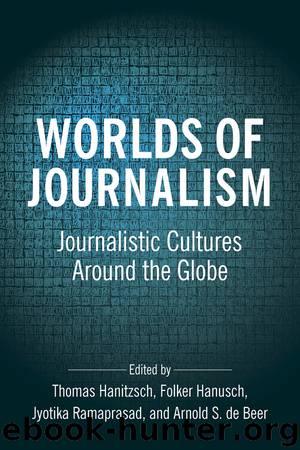Worlds of Journalism by Thomas Hanitzsch

Author:Thomas Hanitzsch
Language: eng
Format: epub
Publisher: Columbia University Press
Conceptualizing and Measuring Journalistic Ethical Orientations and Controversial News-Gathering Practices
Unlike our dual focus on practices and orientations, comparative studies of journalism ethics typically focus only on the way journalists perceive news-gathering practices that are often assumed to be controversial within the profession (i.e., justification of reporting practices). Surveys of journalists around the world widely use this approach, as documented, for instance, in Weaver and Wilhoit (1986, 1996), Weaver (1998a), Weaver and Willnat (2012), and Weaver et al. (2007). These works have served as a significant source for research into questionable journalistic practices, and we too turn to them for guidance on this aspect of journalistic cultures.
Among the controversial news-gathering practices that have long been debated in professional ethics are issues of deception, loyalty to various stakeholders, and journalists’ autonomy and truth telling (Christians, Rotzoll, and Fackler 1991; Harro-Loit 2015; Klaidman and Beauchamp 1987). When journalists pay for confidential information, their autonomy and truth telling are at stake (Boynton 2008; Sanders 2003). When they engage in deception, such as using hidden cameras, claiming to be someone else, or gaining employment in a firm or organization to gather inside information, they are engaging in a deliberate intention to mislead (Christians, Rotzoll, and Fackler 1991). And when journalists use confidential business or government documents without permission, they are making a loyalty choice (Brevini, Hinz, and McCurdy 2013; Harro-Loit 2015; Vanacker 2016) between the public’s right to know and possibly the nation’s safety and corporate security.
For the manifestation of journalistic culture in beliefs/ideas, we turn to Donelson Forsyth’s (1980) taxonomy of ethical orientations. Forsyth created a parsimonious typology of people’s intuitive moral philosophies, using a general ethics position perspective. He based his explanation for variations in morality and moral judgment on the distinction between an ethics of idealism (concern for consequences) and an ethics of relativism (concern for principles). Combining various degrees of idealism and relativism, Forsyth identified four distinct ethics positions: absolutism (rules are to be followed at all times), situationism (the situation decrees the most ethical solution), exceptionism (rules are generally accepted but may be waived if circumstances demand it), and subjectivism (moral judgments should depend primarily on one’s own personal values). Situationists are high, and exceptionists low, on both counts. Absolutists are high in idealism and low in relativism, while subjectivists are high in relativism and low in idealism. Forsyth, Ernest O’Boyle, and Michael McDaniel (2008, 815) suggest that people intuitively make judgments about right and wrong based on their personal ethical posture “developed over a lifetime of experience in confronting and resolving moral issues.”
Lawrence Kohlberg and Richard Hersh’s (1977) stage theory of moral growth provides some insight into how ethical positions may develop over time. According to the authors, people move from the preconventional, through the conventional, to the postconventional stage wherein “the choice is based on principles that supercede conventions,” and people are able “to use more adequate and complex reasoning patterns to solve moral problems” (Kohlberg and Hersh 1977, 57). Thus it may be inferred that, at this
Download
This site does not store any files on its server. We only index and link to content provided by other sites. Please contact the content providers to delete copyright contents if any and email us, we'll remove relevant links or contents immediately.
Cecilia; Or, Memoirs of an Heiress — Volume 1 by Fanny Burney(32527)
Cecilia; Or, Memoirs of an Heiress — Volume 2 by Fanny Burney(31928)
Cecilia; Or, Memoirs of an Heiress — Volume 3 by Fanny Burney(31915)
The Great Music City by Andrea Baker(31898)
We're Going to Need More Wine by Gabrielle Union(19020)
All the Missing Girls by Megan Miranda(15888)
Pimp by Iceberg Slim(14464)
Bombshells: Glamour Girls of a Lifetime by Sullivan Steve(14037)
For the Love of Europe by Rick Steves(13814)
Talking to Strangers by Malcolm Gladwell(13330)
Norse Mythology by Gaiman Neil(13314)
Fifty Shades Freed by E L James(13215)
Mindhunter: Inside the FBI's Elite Serial Crime Unit by John E. Douglas & Mark Olshaker(9289)
Crazy Rich Asians by Kevin Kwan(9261)
The Lost Art of Listening by Michael P. Nichols(7476)
Enlightenment Now: The Case for Reason, Science, Humanism, and Progress by Steven Pinker(7287)
The Four Agreements by Don Miguel Ruiz(6728)
Bad Blood by John Carreyrou(6599)
Weapons of Math Destruction by Cathy O'Neil(6248)
